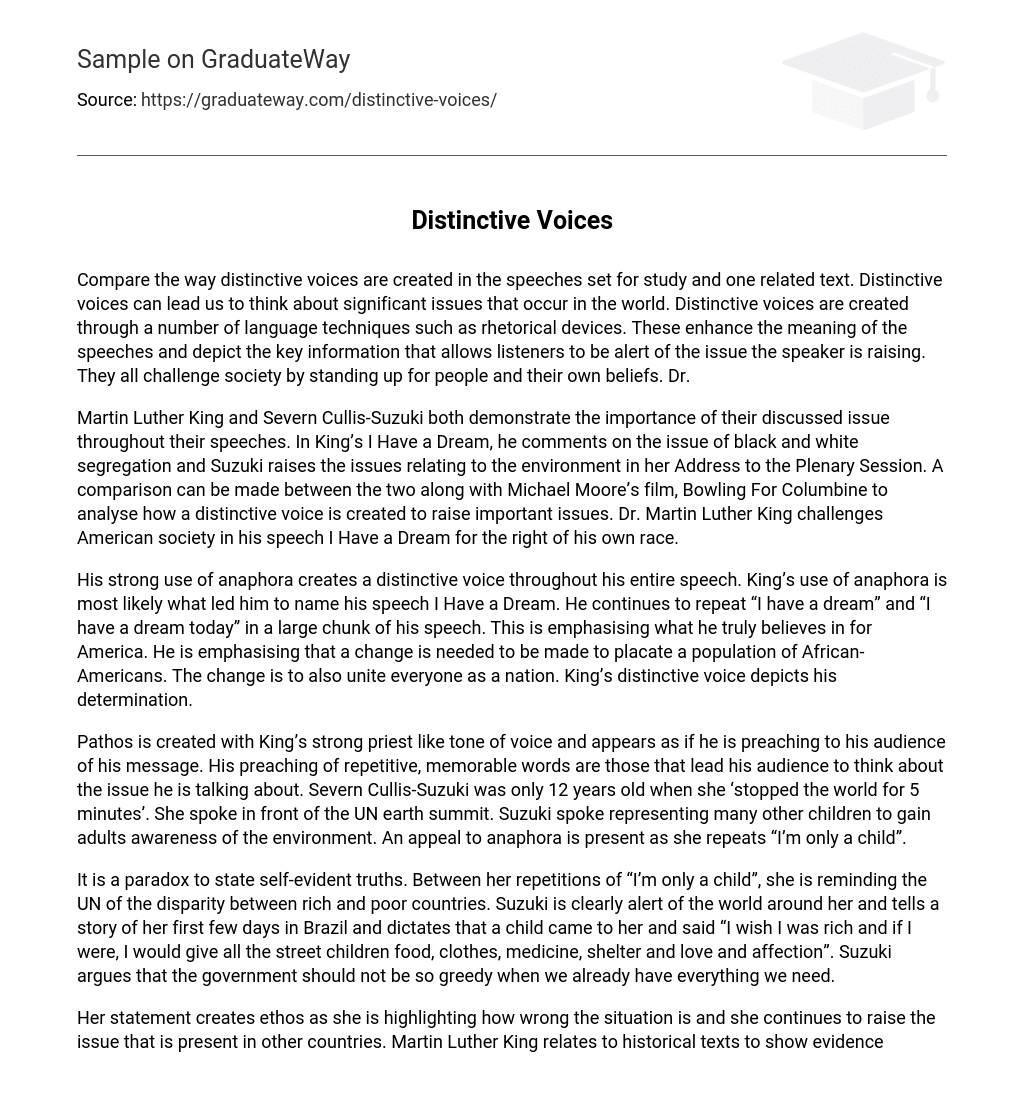When comparing the creation of distinctive voices in the set speeches and a related text, it becomes evident that language techniques, such as rhetorical devices, play a significant role. These techniques not only enhance the meaning of the speeches but also convey pivotal information that raises awareness about important issues. By challenging society and advocating for people and their beliefs, the speakers assert their influence and make a lasting impact.
Both Martin Luther King and Severn Cullis-Suzuki demonstrate the significance of the issues they discuss in their speeches. In King’s speech “I Have a Dream,” he addresses the problem of racial segregation between black and white individuals, while Suzuki raises environmental concerns in her Address to the Plenary Session. By comparing these two speeches with Michael Moore’s film, Bowling For Columbine, we can examine how a unique voice is established to highlight important issues. Dr. Martin Luther King confronts American society in his “I Have a Dream” speech to advocate for the rights of his own race.
Strong use of anaphora characterizes the entirety of his speech, giving it a distinct voice. The repeated phrases “I have a dream” and “I have a dream today” likely inspired him to title the speech “I Have a Dream”. Through this repetition, he emphasizes his genuine beliefs for the future of America. His aim is to bring about change that will address the needs of African-Americans and unite the entire nation. King’s resolute voice effectively portrays his determination.
The use of a strong, priest-like tone in King’s speech creates a sense of pathos. It seems as though he is delivering his message in a sermon-like manner, captivating his audience. The repetition of memorable words encourages contemplation of the issue at hand. Similarly, when Severn Cullis-Suzuki, who was just 12 years old at the time, halted the world for 5 minutes during her speech at the UN Earth Summit, she represented numerous other children and raised awareness among adults about environmental concerns. An appeal to anaphora is evident as she repeatedly emphasizes “I’m only a child.”
It is paradoxical to declare truths that are evident. Amongst her constant affirmations of being “just a child”, she brings attention to the unequal conditions between wealthy and impoverished nations before the UN. It is evident that Suzuki possesses an understanding of the global reality and proceeds to narrate an anecdote involving her initial experiences in Brazil. She shares the encounter where a young child approaches her and expresses, “I yearn to possess wealth and, if I did, I would provide nourishment, clothing, medications, dwellings, love, and care to all the street children.” Suzuki asserts that governments should not be consumed by excessive greed when we already possess everything required.
Her statement establishes credibility by addressing the injustice of the situation and drawing attention to similar issues in other nations. Martin Luther King also utilizes historic literature to support his argument that previous attempts were made to reform American behaviors, citing legal documents that have yet to bring about substantial change. One such instance is his mention of Thomas Jefferson’s Declaration of Independence and its renowned phrase: We believe these truths to be self-evident, that all men are inherently equal.
This statement suggests that it will be universally accepted as correct, rather than just a possibility. King questions why this action was not understood when the document was originally written, emphasizing the societal truths that should have been addressed 150 years prior. This encourages listeners to reflect on the past, particularly how white Americans declared equality for all. Severn Suzuki’s Earth Summit Address brings attention to the deteriorating environment and challenges international governments that have ignored it. Irony, rhetorical questions, and litotes are employed to further demonstrate this concept.
The techniques used can be seen in the sentence “Did you have to worry about these little things when you were my age?”. The irony lies in the word “little”, highlighting that this is not a minor matter but rather an important one requiring attention. Additionally, the use of litotes is present in the understatement of the issue as “little”. By employing a rhetorical question, emotions are elicited from the audience, fostering pathos and gaining sympathy from the United Nations, who can relate to their own inner child.
In his film “Bowling for Columbine,” Michael Moore effectively prompts the audience to ponder and contemplate the past by posing a rhetorical question. He tactfully addresses apprehensions regarding gun control and usage in the United States, urging individuals to critically evaluate their thoughts and emotions. Moore employs a montage technique, incorporating numerous provocative images that serve as a stark reminder for those who possess firearms. To add a touch of irony, diegetic sound is utilized, featuring Louis Armstrong’s “What a Wonderful World” playing alongside the selected footage.
He emphasizes the absurdity of the situation and invokes an emotional response from his audience. The shocking images are intended to bring attention in America to the harm caused by their obsession with firearms. It underscores the necessity for Americans to acknowledge the devastation they bring about. Moore concludes his collection of scenes with a clip of a plane crashing into one of the World Trade Center towers, a tragedy that left America shattered and apprehensive toward Middle Eastern nations. Including this clip assists the audience in grasping the extent of the destruction America had wrought prior to the occurrence of 9/11.
Each of the speeches and films brings up significant issues that require careful consideration and modification to benefit the public. They employ rhetorical devices to underscore their essential points. Both Martin Luther King and Severn Cullis-Suzuki highlight the injustices perpetrated by governments and society, advocating for change that benefits both the present and future generations. Michael Moore’s film establishes an emotional connection with viewers, prompting them to engage in critical thinking. These speakers have crafted their unique voices through bold words and decisions, all aiming to bring about positive change.





